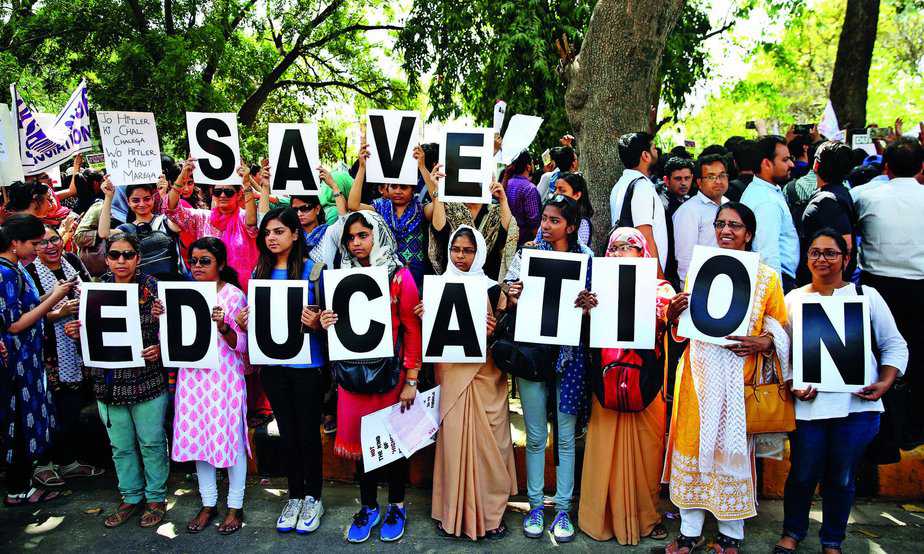
A five-day strike, an ‘Adhikar Rally’, was called by the Delhi University Teachers’ Association (DUTA), following its general body meeting on March 18. A large number of students lent support to it, while an equal number remained indifferent. The strike finally ended with an online petition by the teachers’ outfit, though a march to Parliament has been planned for March 28.
The protest comes in the wake of University Grants Commission (UGC)/ministry of human resource development (MHRD) notifications that, when put into effect, would hit students way more than teachers, and that’s why the students’ indifference is baffling.
The current agitation is centred around not just long-standing issues of ad-hoc teachers and insufficient budgetary allocations to education, but also the 30:70 funding formula for revised salaries as per the 7th Pay Commission, setting up of Higher Education Financing Agency (HEFA) and the issue of autonomy — all of which are more central to students.
The government has declared that increased salaries as per the 7th Pay Commission will be paid through a 30:70 formula, in which the government shall provide 70 per cent of the money, and institutions shall generate the rest. How will institutions generate the 30 per cent? By increasing students’ fees!
This one action alone, if implemented, will substantially increase the cost of higher education and affect a large chunk of students studying in universities (such as DU) that currently have nominal fees.
The setting up and operationalisation of HEFA, first announced in 2016, is another step that has enraged the academic community. Institutions of higher education, traditionally funded through UGC grants, are now slated to be funded through loans from HEFA, a joint-venture between the MHRD and Canara Bank.
Academics see the introduction of loans, and the government’s insistence on institutions arranging funding through corporate partnerships and CSR grants, as steps to commercialise and privatise higher education. Even though the system is not yet fully in effect, institutions, including IITs and NITs, have started to formally register their protest at the highest levels.
Another contentious issue is of autonomy. Last year, St Stephen’s College was in the news when it had reportedly applied for autonomy, causing outrage. Currently, DUTA is also agitating against the government’s move to grant graded autonomy to institutions.
Even as the agitations continue, the government, on March 20, granted autonomy to 60 institutions, which include five central universities, 21 state universities, 24 deemed universities, and eight colleges. It is noteworthy that even as JNU and BHU are on the list, DU is not — as of now.
Prakash Javadekar, HRD minister, spoke of the benefits of “full autonomy” but DU professor Saikat Ghosh highlighted that it is not about the freedom to teach, but about managerial and financial aspects. In a Facebook post, he highlighted how “autonomy” will allow institutions to introduce self-financed courses, increase fees, and escape from regulations and public accountability.
Talking to NewsClick.in, Ghosh traced these recent developments to India’s 2005 commitment to WTO-GATS under the previous UPA regime. The government’s withdrawal from public funding of higher education, Ghosh said, would lead to a rise in student loans, which might lead to a US-like debt burden on students.
Even though autonomy has been provided now, self-financed courses have been on the rise for a while in public universities such as DU. Delhi School of Journalism, started last year, is self-financed. So is Jamia Millia Islamia’s journalism programme.
In the midst of all this, there is another trend that has largely gone unnoticed, which Ghosh touched upon. In recent years, the humanities and social sciences have seen a consistent fall in government funding. Even as the government pledged medical colleges and fellowships to students of IITs and NITs in the Budget, it has been drastically cutting research seats in universities, crippling research in social sciences.
Ghosh linked this to the ongoing attempt to commercialise education. He said the government is only interested in funding courses with marketability, and since the humanities disciplines are not directly linked to the market, the government is not interested in funding them.
All these developments are going to substantially increase the cost of higher education. Considering the gravity of the issue and its far-reaching consequences for students, it becomes imperative that they join the movement helmed by their teachers en masse.
They should, therefore, be very concerned with the DUTA agitation and not take it as a mere holiday.
This article was first published in Newslaundry.
The magistrate said the probe reveals that multiple associates could be absconding, which could tamper…
The cylinder blast injured six police and fire personnel deployed at the house where a…
Multiple operational teams have been deployed to probe the case. Crime and Forensic Science Laboratory…
The initiative focused on a victim-centric approach and aimed at strengthening public trust through proactive…
Six of the suspects have been arrested from different parts of Tamil Nadu and will…
The weather department has predicted a mainly clear sky during the day with the maximum…